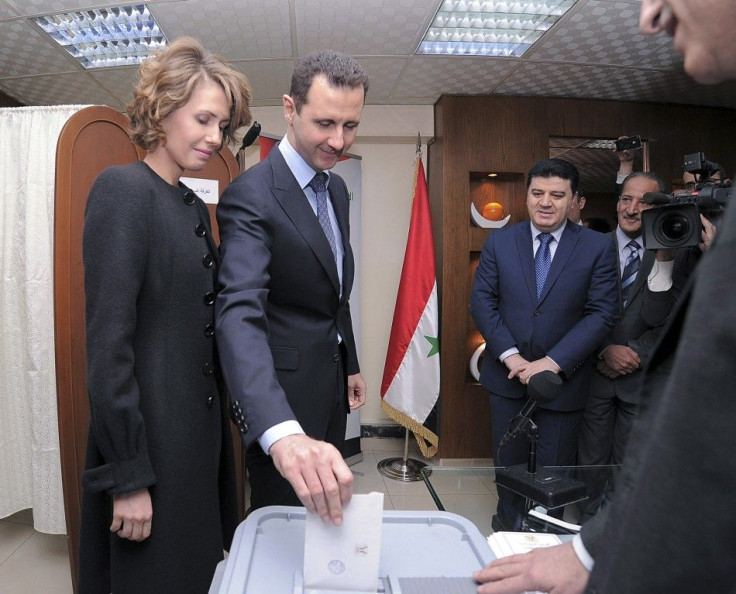Putin Warns West Against Syria Intervention as Assad Stages Referendum

(Reuters) - Syria is expected to announce a vote of approval for constitutional changes on Monday when it announces the result of a referendum dismissed as a sham by opponents of President Bashar al-Assad.
At least 59 Syrian civilians and soldiers were killed in the country's bitter political violence on Sunday, the day of the vote on a new constitution that could keep Assad in power until 2028. The result is viewed as a foregone conclusion.
Russian Prime Minister Vladimir Putin issued a strong warning to the West against military intervention in Syria, its longtime ally, but U.S. Secretary of State Hillary Clinton made clear there was no enthusiasm in Washington for war.
The International Red Cross and Syrian Arab Red Crescent were still negotiating with Syrian authorities and the opposition in an effort to get aid into strife-torn areas of the embattled city of Homs, where conditions were said to be grim.
Assad's reforms would drop an article making his Baath party the leader of state and society, allow political pluralism and enact a presidential limit of two seven-year terms. A multi-party parliamentary election would be held in three months.
But the limit will not be enforced retrospectively, meaning that Assad, already in power for 11 years, could serve another two terms after his current one expires in 2014.
Dozens of people lined up to vote in two polling stations visited by a Reuters journalist in Damascus. I've come to vote for President Bashar, God protect him and give him victory over his enemies, said Samah Turkmani, in his 50s.
Another voter, Majed Elias, said: This is a national duty, whether I agree or not, I have to come and vote.
In Hama, a city with a bloody record of resistance to Baathist rule, one activist said nobody was taking part in the referendum. We will not vote on a constitution drafted by our killer, he said by satellite telephone, asking not to be named.
This is Syria's third referendum since Assad inherited power from his late father. The first installed him as president in 2000 with an official 97.29 percent 'Yes' vote. The second renewed his term seven years later with 97.62 percent in favour.
Syria's revolt began 11 months ago with a wave of mostly peaceful demonstrations against Assad's rule. It has increasingly become an armed conflict between security forces and lightly armed rebels.
We have been trapped in our houses for 23 days. We cannot go out, except into some alleys. Markets, schools and government buildings are closed, and there is very little movement on the streets because of snipers, said an activist in Homs.
He said Baba Amro, had had no food or water for three days. Homs in general has no electricity for 18 hours a day. Tight curbs on independent reporting in Syria make witness reports hard to verify.
The International Committee of the Red Cross said Syrian authorities had not responded to a request for a ceasefire to allow the wounded to be evacuated and conditions were worsening by the hour.
The Interior Ministry acknowledged obliquely that security conditions had disrupted voting, saying: The referendum on a new constitution is taking place in a normal way in most provinces so far, with a large turnout, except in some areas.
The Syrian government, backed by Russia, China and Iran, and undeterred by Western and Arab pressure to halt its assaults, says it is fighting foreign-backed armed terrorist groups.
DANGEROUS ACTORS
Syria's Prime Minister Adel Safar, asked about the opposition call for a boycott, said it showed a lack of interest in dialogue. There are some groups that have a Western and foreign agenda and do not want reforms in Syria and want to divert Syria's steadfastness, he told reporters in Damascus.
Prominent members of the main Syrian National Council formed a splinter organisation on Sunday, exposing the most serious rift among Assad's opponents since the popular uprising against his repressive rule erupted in March.
At least 20 secular and Islamist members of the 270-strong council, which was set up in Istanbul last year, announced the formation of the Syrian Patriotic Group.
The outside world has been powerless to restrain Assad's drive to crush the revolt, which has the potential to slide into a sectarian conflict between Syria's Sunni Muslim majority and the president's minority Alawite sect.
Unwilling to intervene militarily and unable to get the U.N. Security Council to act in the teeth of Russian and Chinese opposition, Western powers have imposed their own sanctions on Syria and backed an Arab League call for Assad to step down.
While the West dismisses talk of a Libya-style NATO role to support Assad's opponents, Gulf Arab states have pushed for a more forceful stance. Saudi Arabia said on Friday it would back the idea of arming rebels - a proposal likely to alarm Moscow.
I very much hope the United States and other countries ... do not try to set a military scenario in motion in Syria without sanction from the U.N. Security Council, Russian Prime Minister Vladimir Putin said.
U.S. Secretary of State Hillary Clinton said any foreign intervention could just fuel further violence.
I think there is every possibility of a civil war. Outside intervention would not prevent that, it would probably expedite it, she told BBC television in an interview.
We have a very dangerous set of actors in the region: al Qaeda, Hamas and those who are on our terrorist list claiming to support the opposition. You have many Syrians more worried about what could come next.
(Editing by Andrew Roche and Michael Roddy)
© Copyright Thomson Reuters 2024. All rights reserved.





















